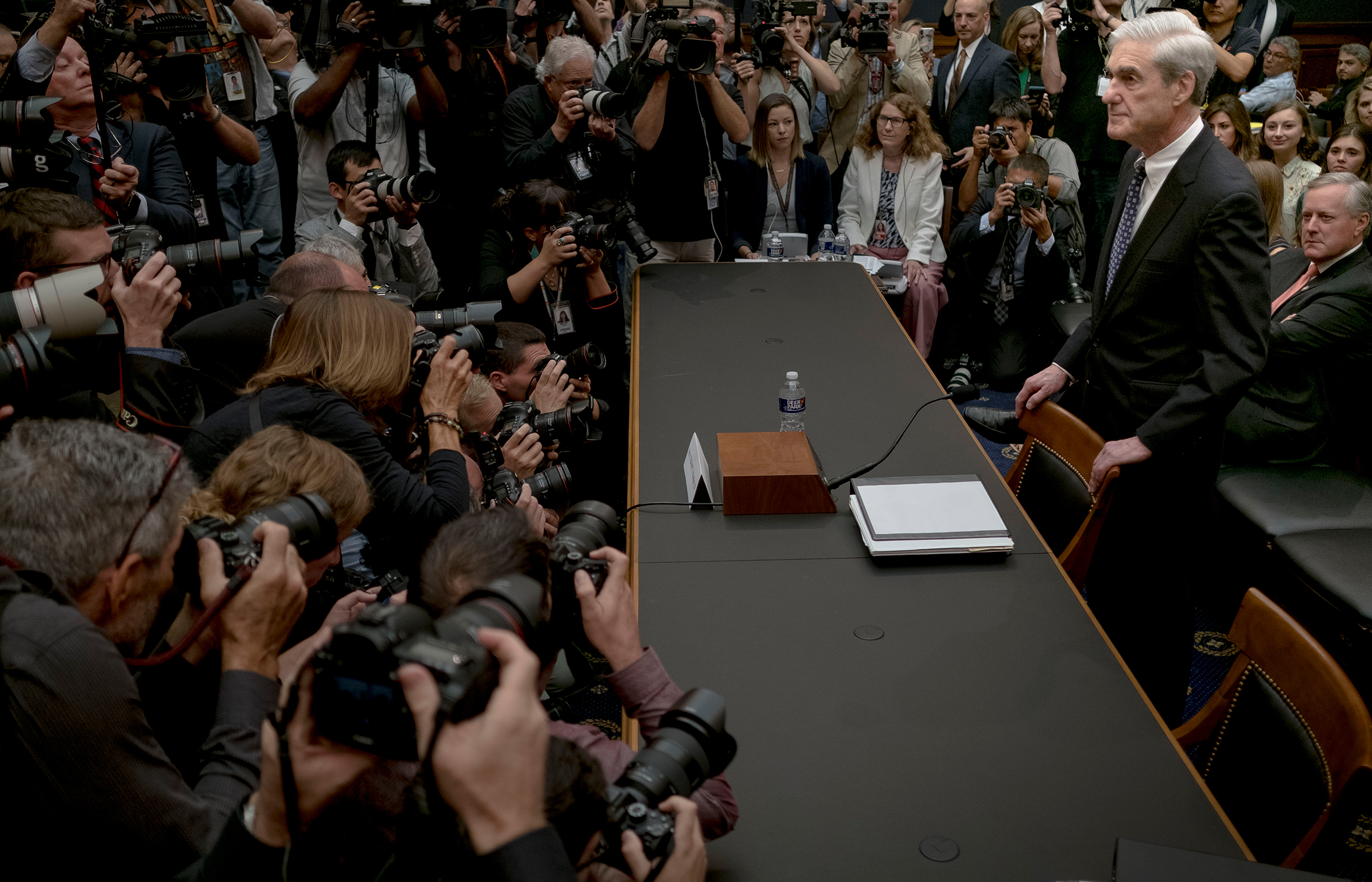
Former Special Counsel Robert Mueller called President Donald Trump’s tweets in 2016 about WikiLeaks “problematic,” marking a rare moment of direct criticism of the President during the former FBI chief’s seven-hour public testimony before Congress on Wednesday.
In an exchange with Democratic Rep. Mike Quigley, Mueller agreed that WikiLeaks is a hostile intelligence service. After reading aloud a few of Trump’s tweets from the month prior to the 2016 election, including one where the future president proclaimed love for reading WikiLeaks, Quigley asked Mueller, “Would those quotes disturb you, Mr. Director?”
“I’m not sure I would say—well, it’s problematic, is an understatement,” Mueller said. “In terms of what it displays, in terms of giving some, I don’t know, hope or some boost to what is, and should be, illegal activity.”
It was one of the strongest criticisms of Trump offered by Mueller in a testimony where the former special counsel said little more about his office’s investigation into Russian interference in the 2016 presidential election than what was publicly known. Appearing before the House Judiciary Committee and House Intelligence Committee, Mueller publicly faced questions for the first time about the investigation.
As he promised during his opening statement and a press conference in May, Mueller’s answers stuck to the text of his report. He kept his answers brief, but reiterated that his investigation did not exonerate Trump.
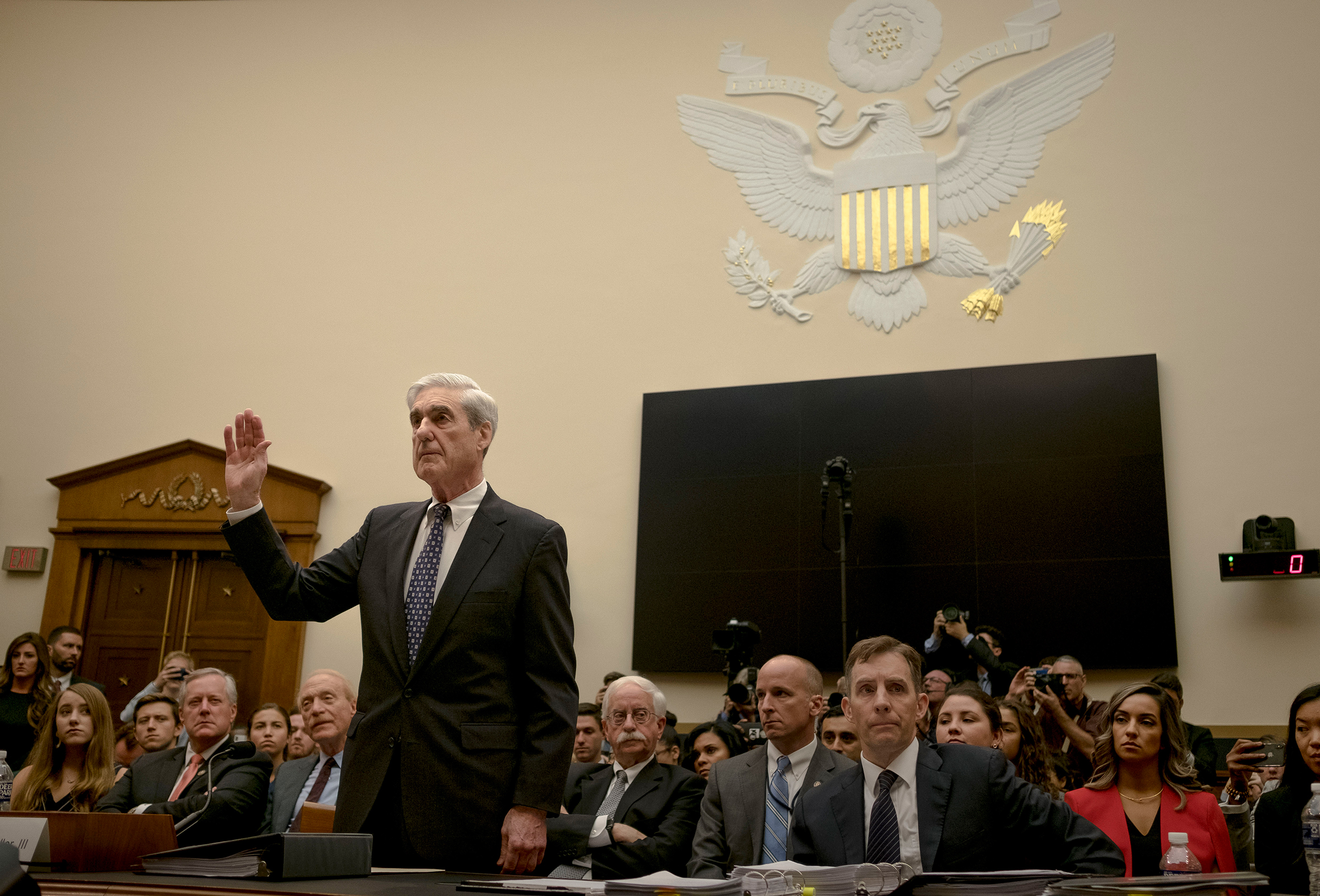
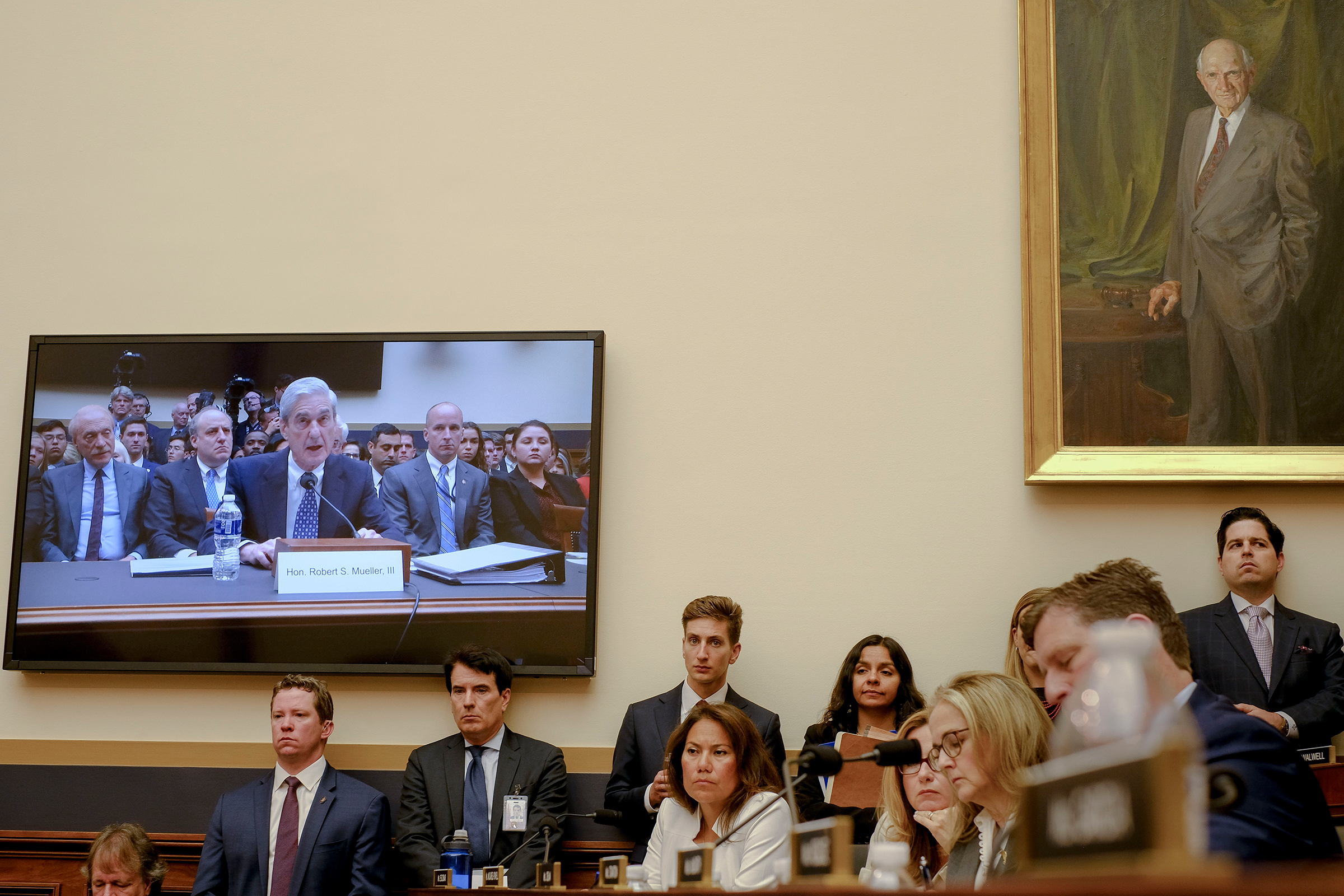
Two distinct lines of questioning emerged along party lines. House Democrats highlighted the guilt of Paul Manafort, Rick Gates, Mike Flynn, and other Trump associates, as well as Trump’s possibly obstructive moves to interfere with the Mueller investigation through former White House Counsel Don McGahn and former Trump campaign manager Corey Lewandowski.
Meanwhile, Republicans tried to discredit or minimize the investigation with questions about Peter Strzok, the former FBI employee who texted anti-Trump text messages; Christopher Steele, the former British intelligence officer; and Joseph Mifsud, a mysterious Maltese professor.
Here are other key updates about Robert Mueller’s testimony before Congress.
What Mueller wouldn’t talk about
Citing DOJ guidance, Mueller said he would not reveal any new information other than what was publicly available in the redacted report. He also stressed that, as a prosecutor, he was limited in what he could share in a public testimony because his comments could affect several ongoing legal matters, including Roger Stone’s case.
“It is unusual for a prosecutor to testify about a criminal investigation, and given my role as a prosecutor, there are reasons why my testimony will necessarily be limited,” he said. “And consistent with longstanding Justice Department policy, it would be inappropriate for me to comment in any way that could affect an ongoing matter.”
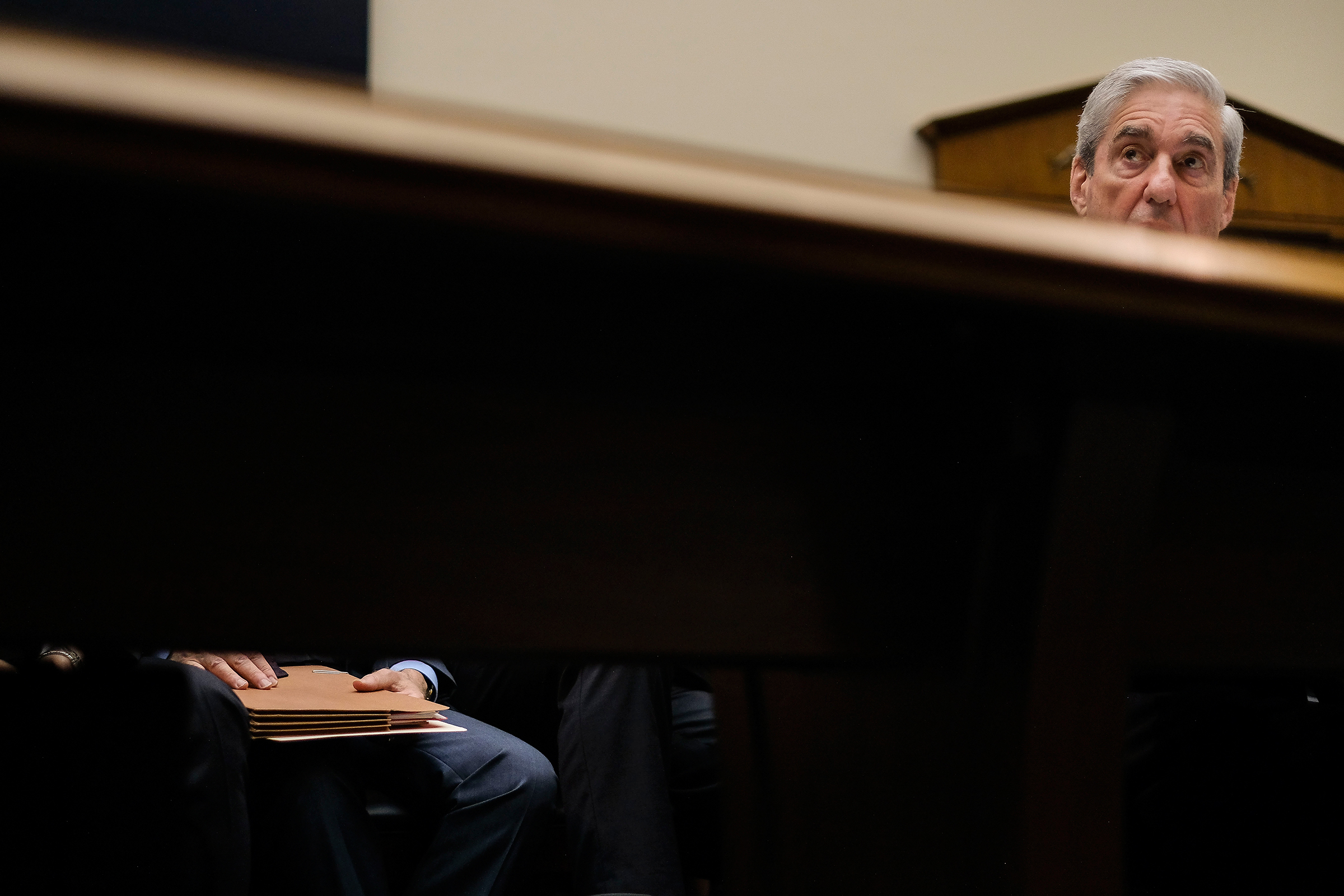
Mueller also declared from the outset that he would not respond to one of the Republicans’ main lines of questioning: “I am unable to address questions about the opening of the FBI’s Russia investigation, which occurred months before my appointment, or matters related to the so-called ‘Steele Dossier.'”
The Mueller report validated some claims from the Steele dossier, debunked one about Michael Cohen, and did not prove others. Republicans have criticized the DOJ’s citation of the Steele dossier in justifying a surveillance warrant in 2016 for Carter Page, who had already left his position as a campaign adviser. Steele was reportedly interviewed in June as a part of the DOJ inspector general’s inquiry into the origins of the investigation into the Trump campaign.
Mueller says accepting foreign assistance ‘unpatriotic’ and ‘wrong’
In a remarkable exchange with House Intelligence chairman Adam Schiff during the final moments of the hearing, Mueller agreed that accepting foreign assistance to a presidential campaign would be “unethical,” before independently raising the possibility that it could be “a crime.” By contrast, Trump told ABC’s George Stephanopoulos in June that if offered foreign information, “I think I’d take it.”
Here’s the full exchange:
Schiff: “From your testimony today, I gather that you believe that knowingly accepting foreign assistance during a presidential campaign is an unethical thing to do.”
Mueller: “And a crime.”
Schiff: “And a crime.”
Mueller: “Under [inaudible] circumstances, yes — and a crime given certain circumstances.”
Schiff: “And to the degree that it undermines our democracy and our institutions, we can agree that it’s also unpatriotic.”
Mueller: “True.”
Schiff: “And wrong.”
Mueller: “True.”
Mueller also provided a definitive response when Schiff asked: “Just referring to ethical standards, we should hold our elected officials to a standard higher than mere avoidance of criminality, shouldn’t we?”
“Absolutely,” Mueller replied.
Mueller says Trump’s written answers ‘generally’ show he wasn’t always truthful
Mueller declined to respond to a question about whether he thought the president was credible, but his subsequent answer to a similar question offered other clues.
“Isn’t it fair to say that the president’s written answers were not only inadequate and incomplete, because he didn’t answer many of your questions, but where he did, his answers showed that he wasn’t always being truthful?” asked Democratic Rep. Val Demings.
“There, uh, I would say, generally,” Mueller replied.
Demings also asked whether Trump’s written responses contained “many answers that contradicted other evidence you had gathered during the investigation.”
“Yes,” Mueller answered.
Trump says Mueller ‘did a poor job’
While getting ready to board Marine One on his way to a fundraiser in West Virginia, Trump called the testimony a “disaster” and said “Robert Mueller did a poor job.”
“We had a very good day today, the Republican Party … there was no defense of what Robert Mueller was trying to defend … there was no defense to this ridiculous hoax, this witch hunt,” Trump said. “The Democrats had nothing and now they have less than nothing.”
It took just three of the seven hours of Mueller’s testimony for the White House to declare victory.
“The last three hours have been an epic embarrassment for the Democrats,” White House press secretary Stephanie Grisham said in a statement after the first round of hearings. “Expect more of the same in the second half.”
Separately, Trump tweeted: “I would like to thank the Democrats for holding this morning’s hearing. Now, after 3 hours, Robert Mueller has to subject himself to #ShiftySchiff – an Embarrassment to our Country!”
The President had also been retweeting reactions to the hearings, including quotes from Fox News.
Mueller wanted to interview Trump
After declining to discuss whether he wanted to interview or subpoena Donald Trump Jr., Mueller did offer an answer to a third question from Democratic Rep. Eric Swalwell: “Did you want to interview the President?”
“Yes.”
Later, Mueller said, “We negotiated with him for a little over a year … we were almost towards the end of our investigation and we had little success in pushing to get the interview of the president.”
Ultimately, Mueller said, the special counsel’s office declined to pursue the subpoena because they anticipated that the president would “fight” it, and wanted to “balance” the benefit of getting an interview with “the necessity of expediting the end of the investigation.”
Russians are interfering ‘as we sit here,’ Mueller warns
Mueller warned that “many more countries” could “develop an ability to replicate what the Russians have done” with respect to interfering in U.S. elections. He also said that Russian attempts to interfere will continue in future elections.
“They’re doing it as we sit here,” Mueller said, “and they expect to do it during the next campaign.”
Mueller told Rep. Will Hurd, a Republican, that legislation allowing intelligence agencies “to work together” on investigating foreign interference in American elections “should be pursued, aggressively early.”
“Much more needs to be done in order protect us against those intrusions,” he told Democratic Rep. Raja Krishnamoorthi. “Not just from the Russians but from other countries as well.”
Mueller says investigation was ‘not a witch hunt’, Russian election interference ‘not a hoax’
Mueller countered Trump’s repeated claims that the special counsel’s investigation was a “witch hunt” during the opening round of questions to the House Intelligence Committee. Chairman Adam Schiff asked the former special counsel, “Well, your investigation is not a witch hunt, is it?”
“It is not a witch hunt,” Mueller replied.
Schiff followed up: “When the president said the Russian interference was a hoax, that was false, wasn’t it?”
“True,” Mueller said.
Later, Rep. Jackie Speier asked a similar question: “Would you agree that it’s not a hoax that the Russians were engaged in trying to impact our election?”
“Absolutely,” Mueller replied. “That was not a hoax.”
Mueller clarifies earlier response on indicting Trump
In the first session, Mueller was asked by Rep. Ted Lieu, a Democrat, about a Justice Department rule that a sitting president cannot be indicted, based on a 2000 memo from the Office of Legal Counsel (OLC). Lieu asked Mueller to confirm that “the reason, again, that you did not indict Donald Trump is because of an OLC opinion stating that you cannot indict a sitting president, correct?” Mueller initially answered, “That is correct.”
However, at the start of the Intelligence Committee hearing in the afternoon, he clarified that answer. Lieu’s wording was “not the correct way to say it,” Mueller said. “As we say in the report and as I said at the opening, we did not reach a determination as to whether the President committed a crime.”
In his opening statement in the morning, Mueller had reiterated the findings of the special counsel’s investigation into Russian interference in the 2016 election, and said his team investigated actions by Trump toward the investigation. “Based on Justice Department policy and principles of fairness, we decided we would not make a determination as to whether the President committed a crime,” Mueller said. “That was our decision then, and it remains our decision today.”
Trump could be indicted after leaving office, Mueller says
Mueller confirmed that a president could still be theoretically indicted after leaving office. Rep. Ken Buck, a Republican, asked: “Could you charge the president with a crime after he left office?” Mueller answered, “Yes.”
Buck appeared to be taken aback by the answer. But that answer is consistent with a footnote in the report, which argues that “a possible remedy through impeachment for abuses of power would not substitute for potential criminal liability after a President leaves office.”
Mueller disputes Trump’s claim he wanted FBI director job
The former special counsel disputed Trump’s claims that Mueller had been rejected after trying to obtain the role of FBI director in the Trump administration. He told Congress that while he discussed the position with Trump before being appointed as special counsel, it was “not as a candidate.”
Trump tweeted on Wednesday that “numerous witnesses,” including Vice President Mike Pence, were privy to Mueller’s “interview” for the FBI director post and that he got “turned down” before he was named as special counsel. A spokesperson for Pence told the Associated Press that the vice president was “present in the Oval Office when Robert Mueller interviewed for the job of FBI Director in May of 2017.”
Mueller defends handling of Peter Strzok/Lisa Page controversy
Repeating one of the Trump’s frequent talking points, Republicans questioned Mueller about former FBI agent Peter Strzok, who was part of Mueller’s investigation, and FBI lawyer Lisa Page. Texts between the two showed them expressing disdain for Trump. “Peter Strzok hated Trump,” Republican Rep. Louie Gohmert said. “You didn’t know that before he was made part of your team?”
“No, I didn’t know that,” Mueller responded. “And when I did find out, I acted swiftly to have him reassigned.” He also noted that the inspector general investigated the deletion of some of the Strzok/Page texts. (The deletions occurred due to technical glitches.)
Trump wanted staff to falsify records, Mueller says
Mueller said Trump asked staff to falsify records pertaining to the investigation. Democratic Rep. Cedric Richmond asked Mueller about evidence from the special counsel’s report that shows Trump urged McGahn to dispute that he was ordered to have the special counsel fired, and acted to deflect further scrutiny of Trump’s conduct toward the investigation.
“So it’s fair to say the president tried to protect himself by asking staff to falsify records relevant to an ongoing investigation,” Richmond said.
“I would say that’s generally a summary,” Mueller answered.
Richmond also asked if Trump’s attempts to get McGahn to create a false record were connected to the president’s concerns about Mueller’s inquiry into whether he committed obstruction of justice.
“I believe that to be true,” Mueller said.
Why Mueller’s report didn’t directly address impeachment
Republican Rep. James Sensenbrenner asked Mueller about “impeachable conduct,” noting that when Ken Starr was the independent counsel investigating former President Bill Clinton’s impeachment hearings, he brought up actions by Clinton that Starr said qualified as grounds for impeachment.
“You didn’t use the word impeachable conduct like Starr did,” Sensenbrenner, who was on the House Judiciary Committee during Clinton’s impeachment, said. “Even the President is innocent until proven guilty.”
The Mueller report does not make recommendations about whether President Trump should be impeached. Mueller does, however, note in his report that it is up to Congress to police a President. “Congress may apply the obstruction laws to the President’s corrupt exercise of the powers of office,” Mueller wrote. That conclusion, he said, “accords with our constitutional system of checks and balances and the principle that no person is above the law.”
Many Democrats in Congress took those words to mean that Congress should, at the very least, pursue an impeachment inquiry to seek the documents the Administration has been withholding. Since Mueller’s report was released, the number of Democrats supporting an impeachment inquiry has risen to nearly 90, according to the New York Times. That has put these members at odds with House Speaker Nancy Pelosi, who has sought to avoid a “divisive” inquiry that could potentially jeopardize Democratic seats in swing districts. The public spectacle of the Mueller hearings may make it even more difficult for Pelosi to keep the caucus united on this issue.
Special counsel report does not exonerate Trump, Mueller says
The president has continued to characterize the special counsel’s investigation as a “witch hunt” while maintaining that Mueller found “no collusion, no obstruction.”
In the first round of questions, House Judiciary chairman Jerrold Nadler asked whether the investigation “totally” exonerated the president––something Trump has repeatedly claimed. Mueller replied, “No.” (The report says, “while this report does not conclude that the President committed a crime, it also does not exonerate him.”)
How did Republicans respond to Mueller’s testimony?
In his opening statement, Rep. Doug Collins – the ranking Republican on the House Judiciary Committee – argued that “the president’s attitude towards the investigation was understandably negative…but he did not shut down the investigation. the President knew he was innocent…nothing we hear today will change those facts.”
Republican Rep. Jim Jordan leaned into a line of questioning that appeared to imply that former Trump campaign adviser George Papadopoulos had been “spied on.” In particular, Jordan suggested that Joseph Mifsud, who approached Papadopoulos to “arrange a meeting between the campaign and the Russian government,” may have been working for a foreign intelligence agency.
“I’m not sure that I agree with your characterizations,” Mueller said.
The Mueller investigation concluded that Papadopoulos “worked with Mifsud and two Russian nationals to arrange a meeting between the campaign and the Russian government. No meeting took place.”
Jordan implied that Mifsud had lied to investigators and asked why Mifsud was not charged like several people in Trump’s orbit were. Later in the day, the ranking member of the Intelligence Committee, Devin Nunes, echoed Jordan’s theory.
Republican Rep. Mike Johnson said during the testimony that Mueller’s investigation cost $30 million and “dragged along” for 22 months. “Nothing ever happened to stop or impede your investigation,” he said. The total reported cost of the investigation is about $25.2 million, and the final tally is likely to fall around $35 million. In his opening remarks, Nadler noted the cost and Republican criticisms of the probe, telling Mueller: “in the Paul Manafort case alone, you recovered as much as $42 million—so that cost of your investigation to the taxpayers approaches zero.”
In one of his more emphatic moments, Mueller defended the integrity of his report after Rep. Tom McClintock, a Republican, accused the special counsel’s office of making a “political case.”
“I don’t think you have reviewed a report that is as thorough, as fair, as consistent, as the report that we have in front of us,” Mueller said.
Republicans weren’t happy Mueller’s deputy joined him
Mueller was joined on Wednesday by Aaron Zebley, his deputy at the Special Counsel’s office, who was responsible for day-to-day oversight of the investigation. Although Republicans objected to Zebley’s appearance, a Mueller spokesperson said Zebley’s appearance had been part of the negotiations with the Judiciary Committee. The announcement was met with swift criticism from Trump, who tweeted that he was a “Never Trumper attorney.” It is unclear what the basis for that claim is, although Zebley previously represented Justin Cooper, a Clinton adviser, while in private practice at WilmerHale.
What did the Mueller investigation find regarding the Russia and the Trump campaign?
The investigation found numerous links between the campaigns and established that the Russian government interfered in the 2016 election in “sweeping and systematic fashion.” However, in Mueller’s own words, the report concluded “that there was insufficient evidence to charge a broader conspiracy” between Russia and the Trump campaign.
The Special Counsel’s investigation led to charges for 34 people, including 26 Russian nationals, as well as three Russian entities. So far, seven people have pleaded guilty, and five have served or are currently serving prison time. (These numbers could potentially increase depending on the final outcomes for Roger Stone, Mike Flynn, and Rick Gates. It is unlikely that the Russian nationals will appear in court.)
Read More: Here Are All the Indictments, Guilty Pleas and Convictions From Robert Mueller’s Investigation
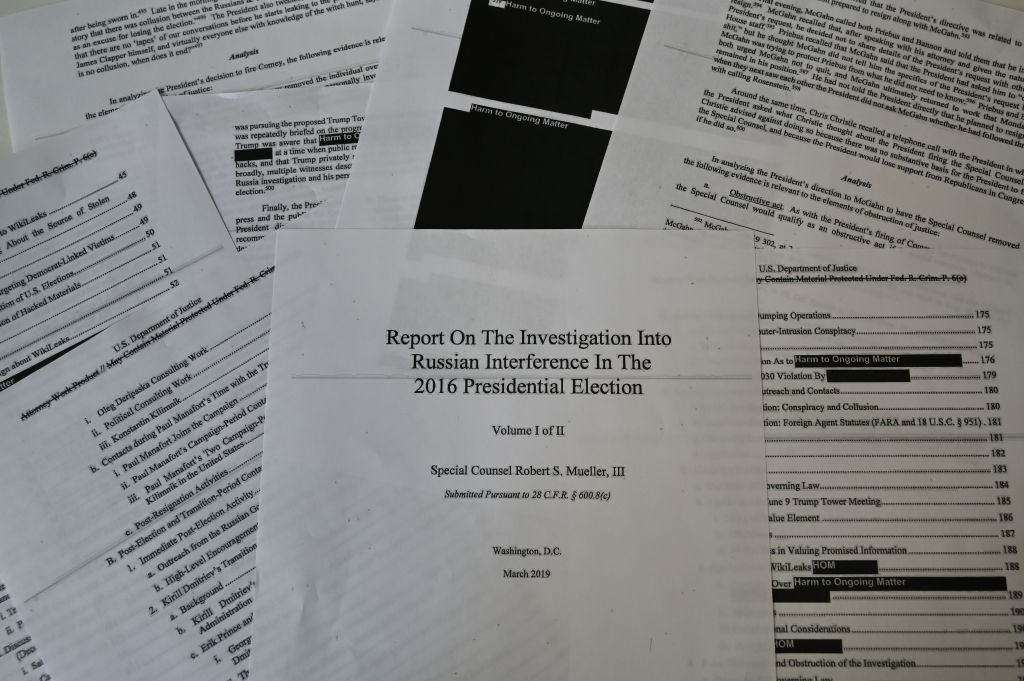
What did the Mueller report say about Trump and obstruction of justice?
During his May 29 press conference, Mueller said: “If we had had confidence that the President clearly did not commit a crime, we would have said so. We did not, however, make a determination as to whether the President did commit a crime.” Mueller referred to Volume II of the report for his explanation, which outlined Justice Department policy that a President cannot be charged with a crime while he is in office. The basis for that legal argument, according to the report, is that charging a sitting President with a crime would undermine the President’s ability to oversee the criminal justice system.
Mueller also said, “We concluded that we would not reach a determination one way or the other about whether the President committed a crime. That is the office’s final position, and we will not comment on any other conclusions or hypotheticals about the president.”
Read More: Obstruction of Justice Usually Happens Behind Closed Doors. But Trump’s Actions Were Public
Although the special counsel did not charge the President with obstruction of justice, the office did bring charges against Trump associates for obstruction-related offenses. Trump’s former attorney Michael Cohen, for instance, pleaded guilty in November to lying to Congress. In December, he was sentenced to two months in prison and fined $50,000.
More Must-Reads From TIME
- The 100 Most Influential People of 2024
- The Revolution of Yulia Navalnaya
- 6 Compliments That Land Every Time
- What's the Deal With the Bitcoin Halving?
- If You're Dating Right Now , You're Brave: Column
- The AI That Could Heal a Divided Internet
- Fallout Is a Brilliant Model for the Future of Video Game Adaptations
- Want Weekly Recs on What to Watch, Read, and More? Sign Up for Worth Your Time
Write to Mahita Gajanan at mahita.gajanan@time.com